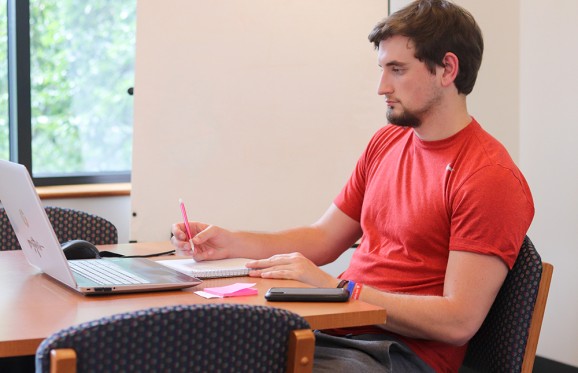On Campus
Muskingum Pivots to Online Learning Through the End of the Semester
All of Muskingum’s classes have now moved to an off-campus learning environment through the end of the Spring 2020 semester, thanks to the dedication and creativity of faculty and staff from across the campus.
The Muskie community quickly came together to transform the way we deliver our students’ education:
100% of Courses Shifted Online
For Director of Computer and Network Services Ryan Harvey '85 and his staff of 6, the shift to remote instruction entailed providing 100% of students and faculty with access to Blackboard and Microsoft Teams/Sharepoint sites.
While many faculty were already utilizing Blackboard – the University’s online learning platform– the Microsoft Teams sites which allow faculty and students to collaborate electronically in real time through video conferencing were new to everyone.
Within several days, CNS had created nearly 650 new Teams sites, along with new Blackboard sites for courses lacking them, and began providing Teams user training.
Working closely with the physics and engineering departments, CNS also ensured that critical learning software previously available only through on-campus labs could be accessed remotely by faculty and students.
CNS also prepared multiple devices for faculty and staff to use while working at home.
Faculty Provide Online Instruction Training
References/Web Resources Librarian and Assistant Professor of Library Science Alaine Kay, Associate Professor of Health Science Dr. Hallie Baker, and Graduate and Continuing Studies Faculty Coordinator Kelly Coffey joined together on extremely short notice to develop and offer online instruction training to their faculty colleagues.
Within 48 hours of the initial decision to hold two weeks of off-campus instruction, a full 8:00 a.m. – 5:00 p.m. of training sessions and workshops were developed and presented to faculty. This training prepared our faculty for the move to online learning for the entire semester.
The range of topics relevant to online instruction included pedagogy, lecture formats and options, video chat and conferencing, online testing and assignments, methods for presenting online science labs, and accessibility.
SUPPORTING STUDENT ACCESS FROM OFF CAMPUS
University Registrar Daniel Wilson created a student survey to identify any off-campus barriers to student learning.
The surveys were distributed to students before they left campus, and within 24 hours over 90% of students had responded. Based on those responses, CNS made multiple devices available to loan to students, and students were provided with information on COVID-19 programs for free internet service offered through major cable providers.
Faculty received the results for each student in their classes, along with coaching on how to modify their teaching methods to accommodate students’ needs. The results were also shared with students’ advisors.